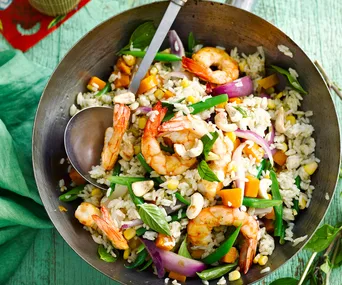One day we’re told to gulp down an espresso to better our workout, the next, our go-to cup of coffee can apparently wreak unimaginable havoc on our health.
“Many studies have linked drinking coffee with reduced risk of heart disease, metabolic syndrome, obesity, and diabetes,” says naturopath and holistic nutritionist Erika Morvay at Fusion Health.
“But on the other hand, recent studies and the science of epigenetics suggest that the health effects of drinking coffee are not the same for everyone.”
Seriously, what gives?!
In a bid to find out if our love of coffee is doing us more harm than good, Morvay, along with professional skincare expert, nutritional medicine practitioner and author of the book The Forensic Nutritionist Fiona Tuck, as well as nutritionist and celebrity chef Zoe Bingley-Pullin, are here to set the record straight.

It all depends on how you actually have your coffee
According to Bingley-Pullin, the dangers coffee can sometimes be associated with come from what an instant brew can possess.
What’s more, she says that “acrylamide, a potentially carcinogenic chemical that forms when coffee beans are roasted; is believed to be more concentrated in instant coffee”.
“Coffee from freshly ground coffee beans is preferred over instant,” she explains.
“Roasting can involve use of chemicals so always best to choose organic where possible.”

^ Noted.
It’s sometimes the things you add to your coffee that are bad for you – not coffee, itself
“Adding sugar and flavoured syrups to coffee certainly doesn’t add additional health benefits and is not recommended,” Tuck adds, who recommends opting for minimally processed milk of the whole, full-fat variety.
“The fats from the milk help with satiety, keeping you feeling more satisfied for longer.”
Like everything, moderation is key (so, keep ordering your pre-work lattes with confidence)
New research published in the British Medical Journal suggests that drinking up to four coffees a day could, in fact, be good for your health.
How? Well, researchers argue that high consumption of coffee was found to reduce a person’s risk of prostate cancer, endometrial cancer, melanoma, oral cancer, leukaemia, non-melanoma skin cancer and liver cancer.
However, according to Tuck, telling people that they can go “hell for leather” and drink 3-4 cups of coffee a day isn’t necessarily the best thing for every individual’s health.
“Coffee is a stimulant that helps mental alertness and energy levels, however, for many people too much caffeine on an already over stimulated, stressed out nervous system is simply system overload,” Tuck tells us.
“I would not recommend four cups a day to a stressed or highly anxious individual or for someone with a heart problem (even though the antioxidants from the coffee may be beneficial there are plenty of other sources of antioxidants such as fresh fruits and vegetables).”
While each and every coffee-drinker will have their own perceptions of what is a normal and healthy amount (four a day seems adequate… right?) our experts are in an unanimous agreement that we should only be consuming as many cups as our hands can hold.
“I recommend 1-2 cups of coffee per day for most people,” Morvay says, while Bingley-Pullin reiterates that intake comes down to the individual.
“If coffee triggers anxiety or insomnia it should be limited, but if it supports energy and mood, aim for no more than two cups daily,” she says.
Tucks says that you also need to be careful of the type of coffee you’re drinking (organic natural coffee is less sprayed and processed)and what is added to the coffee.
“Sugar, syrups, whipped cream can all add extra calories and sugar which counteracts the health benefits of the antioxidants in the coffee,” she says.
“It’s all about balance and moderation. Find what works for you and don’t use the 4 cups a day to go hell for leather with whipped cream, chocolate laden caramel lattes!”
The takeaways?
We love coffee
Coffee can be good for you
Coffee can also be not so good for you
Drink coffee but not too much
Avoid instant – it’s rubbish anyway
Don’t go OTT on the (albeit delicious) sugar-filled additions



